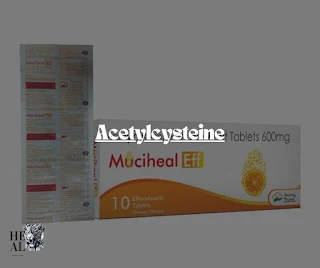Table of Contents
Understanding Acetylcysteine:
Overview: Acetylcysteine is a medication employed to prevent or mitigate liver damage resulting from the ingestion of excessive amounts of acetaminophen (Tylenol).
Varieties of Acetylcysteine:
There are different brands and formulations of acetylcysteine available, some of which can be obtained over the counter. It is essential to note that not all forms of acetylcysteine serve as effective antidotes to acetaminophen. Attempting to address an acetaminophen overdose without professional medical advice is strongly discouraged.
Diverse Applications:
Beyond its primary use as an acetaminophen antidote, acetylcysteine may have additional applications not explicitly detailed in this medication guide.
Acetylcysteine Side Effects:
In case of an allergic reaction, characterized by hives, difficulty breathing, or swelling of the face, lips, tongue, or throat, seek emergency medical assistance. Serious side effects necessitating immediate medical attention include persistent vomiting, coughing up blood, or vomit resembling coffee grounds. Signs indicating the medication might not be effective include upper stomach pain, loss of appetite, dark urine, clay-colored stools, or jaundice (yellowing of the skin or eyes). Common side effects encompass nausea, vomiting, upset stomach, rash, or fever.
Warnings:
In emergency situations, where communication about health conditions might be challenging, it’s crucial to ensure that subsequent caregivers are aware of the acetylcysteine administration. Individuals allergic to acetylcysteine should refrain from its use. Prior to taking acetylcysteine, inform caregivers if there is a history of stomach ulcers, stomach bleeding, high blood pressure, congestive heart failure, kidney disease, or if you are on a low-salt diet. Pregnant or breastfeeding individuals should consult a doctor before using acetylcysteine.
Administration Guidelines:
Administer acetylcysteine exactly as directed on the label or as prescribed by the doctor. If in an emergency setting, caregivers may conduct a blood test to measure acetaminophen levels before initiating acetylcysteine treatment. The duration of treatment will be determined by the doctor, and it’s imperative not to discontinue the medication without their advice. If vomiting occurs within an hour after taking acetylcysteine, an additional dose may be necessary. Store the medication at room temperature, away from moisture and heat.
Precautions During Use:
Adhere to the doctor’s instructions regarding food, beverages, and activities while taking acetylcysteine.
Drug Interactions:
Various drugs, including prescription and over-the-counter medications, vitamins, and herbal products, may interact with acetylcysteine. Inform the doctor about all current medications and any new ones initiated or discontinued.

